Key finding
The sector is not taking environmental responsibility

On the road to Paris: Companies not on track
More than one-quarter of the world’s GHG emissions stem from activities associated with agriculture, forestry, and land-use change. Unless actively addressed, these emissions are likely to increase due to population growth increasing the demand for food. Only 26 of the largest 350 food and agriculture companies are actively working to reduce emissions from their direct activities (scope 1 and 2) through science-based targets, aligned with the 1.5-degree trajectory as recommended by the Paris Agreement.
Indirect emissions (scope 3) from supply chains account for over 80% of total emissions for food companies. However 202 companies do not publicly calculate these, let alone set targets for reduction. Such inaction is most concerning among companies involved in the downstream value chain segments such as food and beverage processors and retailers, among which only six companies in the benchmark are comprehensively reporting progress towards reducing their scope 3 emissions. With the latest Intergovernmental Panel on Climate Change report revealing the alarming impacts of global warming above the 1.5-degree trajectory, food and agriculture companies have a significant responsibility to take action before time runs out.
Key industries yet to set targets on eliminating deforestation
Converting land, such as forests and peatlands, to farmland accounts for 80% of global land conversion, majorly impacting biodiversity and contributing towards climate change. Yet companies are not curbing how their activities are impacting biodiversity and nature loss due to deforestation. 189 companies have not set deforestation targets on their high-risk commodities and while 86 companies have set some form of deforestation target, and report progress against it, companies have yet to achieve a 100% deforestation-free supply chain for all of their high-risk commodities.
The animal proteins sector is a key contributor towards deforestation due to the production and sourcing of livestock and soy for animal feed. This sector performs the worst of all; over half of animal protein companies have not committed to achieving a deforestation-free supply chain. With an estimated 13 million hectares of forest destroyed every year, we urgently need targets to translate to action.
Regenerative agriculture is gaining traction but needs a boost
Current unsustainable agricultural practices have led to the degradation of around one third of the world’s soil and caused significant negative impacts to biodiversity. Scaling regenerative agricultural practices can increase agrobiodiversity and resilience, boost total productivity and the nutritional status of diets, while reducing the need for water and agricultural inputs.
Around 45% of companies in scope provide evidence that they are contributing towards improving soil health and increasing agrobiodiversity. Of these companies, only 6% have evidenced their commitments concretely by providing quantitative data or setting company-wide targets specifically towards improving soil health and agrobiodiversity. In terms of reducing water use, only three companies across the agricultural inputs and food and beverage processor segments demonstrate leadership in reducing water use across their operations and supply chain, including in their water-stressed areas. Given that the global food production system exceeds several of our terrestrial planetary boundaries, there is an urgent need to transform the system through production practices that regenerate the environment in order to continue feeding the growing population.
Commitments to curb food loss and waste need action
Recent reports reveal that approximately 1.2 billion tonnes of food is lost on farms alone, during and after harvest. Further down the value chain, food waste is a major contributor to emissions, accounting for around 8–10% of global greenhouse gas emissions, in addition to contributing to growing food insecurity.
Recognising the urgency of this issue, the UN SDG 12.3 is aimed towards halving per capita food loss and waste globally by 2030. Despite the growing number of industry coalitions, such as the 10x20x30 initiative tackling food loss and waste, 138 companies in scope of the benchmark are yet to set targets or report against SDG12.3. However, of those that are taking action, six companies across various value chain segments are demonstrating leadership through reporting progress on their reduction targets and working with partners to prevent food loss and waste across their value chain.
